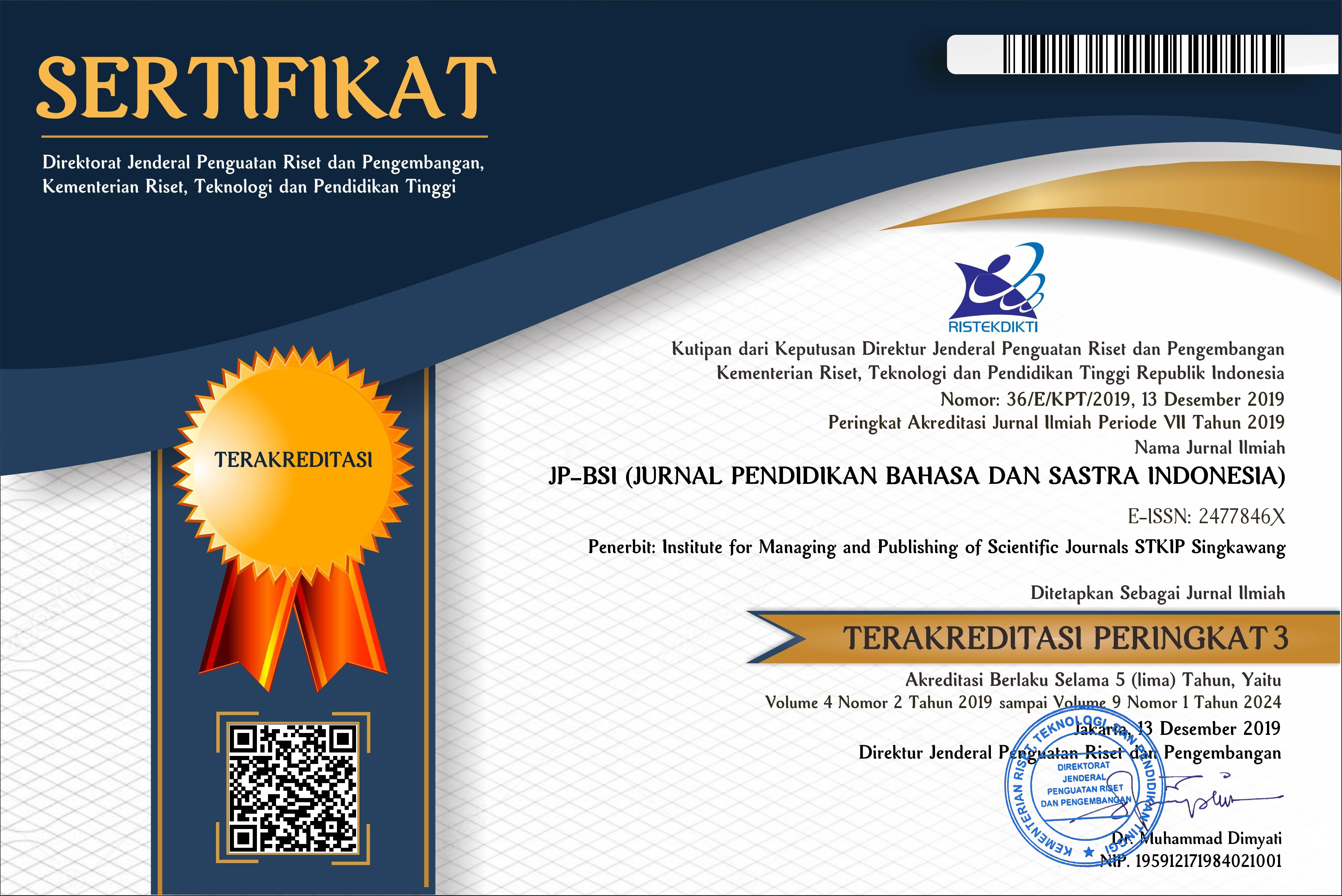Cultural Value in Mantra Menyapih in Village Communities: Literature Function Study
Abstract
In fact, the tradition of weaning spells is still developing and surviving to this day, the existence of this tradition is indeed needed by the community for their children to suckle their mothers. Stopping the child from sucking on his mother again is indeed quite difficult, so the people bring their children to suwuk experts, in this case dukun, kyai and local leaders. Suwuk expert will say rapalan or mantra in this case. The purpose of this study is to describe cultural values in the weaning mantra on rural communities: the study of literary functions. This study uses an observation method with ordinary observations because of observations carried out by researchers without being involved in direct contact with the actors (informants) who were the target of the research. The results of this study, people still use the services of expert suwuk in this case can dukun, suwuk experts, or traditional leaders, so that their children stop asking for milk.
Keywords
Full Text:
PDFReferences
Bahar, H. M., & Teng, A. (2017). FIlsafat Kebudayaan dan Sastra (dalam Perspektif Sejarah). Ilmu Budaya, 5, 69–75.
Danandjaja, J. (1984). Folklor Indonesia, Ilmu Gosip, Dongeng, dan lain-lain. Jakarta: Grafiti Press.
Daskon, C. D. (2015). Significance of cultural values in securing asset portfolios of rural communities. Sri Langka Journal of Social Science, 38(1), 31–50.
Djamaris, E., & dkk. (1996). Nilai Budaya dalam Beberapa Karya Sastra Nusantara: Sastra Daerah di Kalimantan. Jakarta: Pusat Pembinaan dan Pengembangan Bahasa Departemen Pendidikan dan Kebudayaan.
Efendi, A. (2016). Implementasi Kearifan Budaya Lokal pada Masyarakat Adat Kampung Kuta sebagai Sumber Pembelajaran IPS. Sosio Didaktika: Social Science Education Journal, 1(2). https://doi.org/10.15408/sd.v1i2.1263
Gazalba, S. (1979). Kebudayaan Sebagai Ilmu. Jakarta: Pustaka Antara.
Hidayat, A., Rahmanita, M., & Hermantoro, H. (2017). Community Empowerment in Plempoh Cultural Tourism Village. Tourism Research Journal, 1(December). https://doi.org/10.30647/trj.v1i1.11
Hun, K. Y. (2012). Pembelajaran Bahasa Indonesia di Perguruan Tinggi Korea : Sarana Menjelajahi Dunia Global. Proceeding International Seminare, 23–31.
Jenks, C. (1993). Culture (Konsep Budaya) Oleh : CHRIS JENKS Penerjemah : Arie Setyaningrum Pamungkas Editor : Novi Kurnia BUDAYA. Salford.
Khairi Abu Syairi. (2013). Pembelajaran Bahasa dengan Pendekatan Budaya. Dinamika Ilmu, 13(2), 174–188.
Koentjaraningrat. (1990). Sejarah Teori Antropologi II. Jakarta: UI Press.
Koentjaraningrat. (1993). Sejarah Teori Antropologi I. Jakarta: UI Press.
Koentjaraningrat. (2003). Pengantar Antropologi I. Jakarta: Rineka Cipta.
Oakes, T. (2006). Cultural strategies of development : implications for village governance in China. The Pacific Review, 19(1), 13–37. https://doi.org/10.1080/09512740500417616
Prayogi, R., & Daniel, E. (2016). Pergeseran Nilai-Nilai Budaya Pada Suku Bonai Sebagai Civic Culture Di Kecamatan Bonai Darussalam Kabupaten Rokan Hulu Provinsi Riau Ryan Prayogi, Endang Danial. Humanika, 23(1).
Rizal, M. S. (2015). Karifan Lokal dalam Mantra Masyarakat Samin. Bastra, 2.
Rukesi, & Sunoto. (2017). Nilai Budaya dalam Mantra Bercocok tanam Padi di desa Ronggo, Kecamatan Jaken, Kabupaten Pati, Jawa Tengah. Basindo, 1(1), 25–45.
Saliyo. (2012). Konsep Diri dalam Budaya Jawa. Buletin Psikologi, 20(2), 26–35.
Setiawan, E. (n.d.). Kamus Besar Bahasa Indonesia (Online). Jakarta: Badan Pengembangan dan Pembinaan Bahasa, Kemdikbud (Pusat Bahasa).
Sorayah, Y. (2014). Funsi dan Makna Mantra Tandur di Desa Karangnunggal Kecamatan Cibeber Kabupaten Cianjur. Bahtera Sastra, 2.
Spencer-Oatey, H. (2012). What is Culture ? In Global PAD Core Concepts.
Sudjiman, P. (1986). Kamus Istilah Sastra. Jakarta: Gramedia.
Sutopo. (2002). Metode Penelitian Kualitatif : Teori dan Aplikasi dalam Penelitian (Cetakan Pe). Surakarta: UNS Press.
Tim Penyusun. (2008). Kamus Besar Bahasa Indonesia (Offline). Jakarta: Pusat Bahasa.
DOI: http://dx.doi.org/10.26737/jp-bsi.v4i2.1021
Refbacks
- There are currently no refbacks.
Published by:
Institute of Managing and Publishing of Scientific Journals STKIP Singkawang
e-ISSN: 2477-846X
p-ISSN: 2477-5932
Sekolah Tinggi Keguruan dan Ilmu Pendidikan (STKIP) Singkawang
Address : STKIP Singkawang, Jalan STKIP - Kelurahan Naram Singkawang, Kalimantan Barat, INDONESIA, 79251
No. Telp. : +62562 420 0344
No. Fax. : +62562 420 0342

Editor in Chief: [email protected] / Wa: +6281256252769
Coordinator: [email protected] / [email protected] / Wa: +6282142072788
Management Tools
JP-BSI Indexed by:
JP-BSI (Jurnal Pendidikan Bahasa dan Sastra Indonesia) is licensed under a Creative Commons Attribution-NonCommercial 4.0 International License.


















